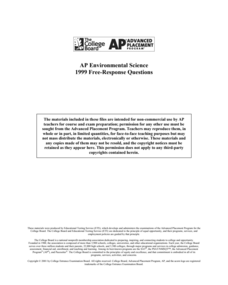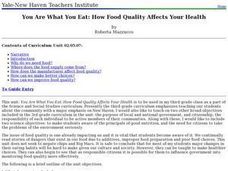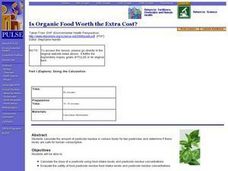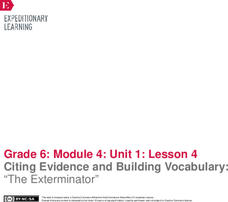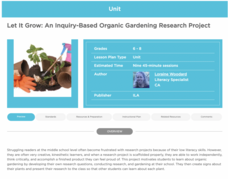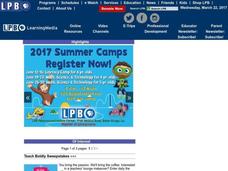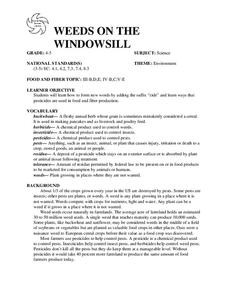College Board
1999 AP® Environmental Science Free-Response Questions
Pollution is a real concern in most areas of Earth. A four-question AP® assessment has learners analyze data related to water pollution and air pollution as well as consider the pros and cons of recycling. Each question has several...
Curated OER
Chemicals in Your Life
In this chemicals activity, students fill in 61 blanks of statements comparing the chemicals used in farming and the chemicals found in medicines and food.
Curated OER
Diet: You Are What You Eat
Third graders examine the issue of food quality to assess the dangers of pesticides, additives, and improper food preparation. After keeping food diaries and categorizing foods, they fill in food pyramids based on their journal entries....
Curated OER
Potential Hazards in Your Home
Students increase their awareness of the hazardous chemicals humans come in contact with, and explore less hazardous alternatives.
Curated OER
Fertilizers, Pesticides and Human Health- American Lessons
Students explore migration and why people move. They explore the movement of native populations. Students explore the economy as an factor in migration. They discuss the exploitation of the migrant worker.
Curated OER
Is Organic Food Worth the Extra Cost?
Young scholars calculate the amount of pesticide residue in selected foods for two
pesticides and determine if these levels are safe. They read an article about a
research study looking for metabolites of these pesticides in children....
Curated OER
The Global Impact of Insect Borne Diseases & Agriculture
Students study the global impact of insect borne diseases, the appropriate use of pesticides, and the concept of human interrelations on a world wide scale. They examine how to safely apply a pesticide, according to the label.
Curated OER
American History: Finding your Voice
Students are able to write a speech and create a slogan through analysis of current issues articles dealing with pesticide use. They put themselves in the position of one of the workers affected by the story they read.
Curated OER
LD50 of NaCl to Gammarus spp.
Students learn the meaning of LD50 through lecture and discussion. Through experiment, students graph and calculate the LD50 of salt on fresh water amphipods. Students compare results of the experiment with pesticides and pollutants.
It's About Time
Competition Among Organisms
Who knew plants could be so competitive? Join your class as they observe plants competing for space and nutrients. Middle and high schoolers describe possible effects of introducing a new species into an already established ecosystem,...
Virginia Department of Education
Changes in Ecosystems
How does water pollution affect the environment? Provide your class with the resources to answer this question as they learn about eutrophication and ecosystem changes. Over two weeks, they simulate the effects of pollution on the...
Balanced Assessment
County Concerns
Apply area concepts to help farmers and settle county disputes. Scholars use a given diagram and information about an insecticide spraying campaign to determine the monetary benefit to farmers. They then decide which of two counties has...
EngageNY
Citing Evidence and Building Vocabulary: “The Exterminator”
It is an out-of-body experience. Scholars take a look at the sidebars outside the body of the text in The Exterminator. They discuss the purpose of this type of text feature and work to determine the gist. Learners write unfamiliar...
ReadWriteThink
Let It Grow: An Inquiry-Based Organic Gardening Research Project
How does your garden grow? An inquiry-based, organic gardening unit asks young scientists to research a vegetable or flower, create an environment for it, and then plant and tend to the seedling. Gardeners develop their own research...
Curated OER
Watersheds and Wetlands
Students investigate watersheds and wetlands. In this watersheds and wetlands lesson, students complete a 17 step lesson plan to build a watershed. Students then complete another 9 step lesson to build a watershed with wetlands and...
Curated OER
Integrated Pest Management
Students investigate the different methods used in integrated pest management. In this biology lesson, students evaluate experiments and case studies on IPM. They discuss the pros and cons of using this method.
Curated OER
How Does Your Garden Grow?
Young scholars explore how to use natural fertilizers and pesticides by growing an organic vegetable garden by growing plants and using a variety of soil amendments.
Curated OER
Food Chains Are Not A Necklace!
Second graders examine how food chains interact with different plants and animals. They practice using new vocabulary. They also discover the role of pesticides in the environment.
Curated OER
WEEDS ON THE WINDOWSILL
Discuss the suffix "cide." Have students name words having this suffix (homicide, suicide, genocide). Ask students what all these words have in common. Then ask students to define the word "pesticide." (Pesticides control organisms that...
Environmental Protection Agency (EPA)
Learn About Chemicals Around Your House
Take a house tour and play some games to learn about household products that have chemicals and how to be safe around them. From the U.S. Environmental Protection Agency (EPA).
Curated OER
Sustainable Agriculture: Soils And Food Production
Ninth graders recognize differences in soil quality from one area to another. They describe the importance of organic matter in soil health and suggest ideas that help provide adequate food supplies for the world. The interview a person...
Curated OER
From Milk to Cheese & Seed to Shelf
Learn about food production by making cheese, seeing how a seed gets to a shelf, and discussing food safety. Budding agriculturalists complete several activities and learn about food production, biotechnology, food preservation,...
Curated OER
High-Tech Food: Science in Your Shopping Cart
Kids are given a lot to think about, as they delve into the world of high-tech foods. They discuss GMOs, biotechnology, food enhancements and domestication. They view videos, engage in class discussions, complete worksheets, and learn...
Alabama Learning Exchange
Make a Difference!
We are very dependent upon other life forms around us to survive. Here, scholars explore relationships in the ecosystem with the help of Auntie Litter and the pollution patrol. They imagine a world without grass, making connections to...
Other popular searches
- Pesticides Food
- Harmful Pesticides
- Pesticides and Their Harm
- Pollution Pesticides
- Comparing Pesticides
- Pesticides for the Farm
- Agriculture Pesticides
- Pesticides and the Danger
- Synthetic Pesticides
- Pesticides and Insect
- Chemical Elements Pesticides
- Herbicides and Pesticides


